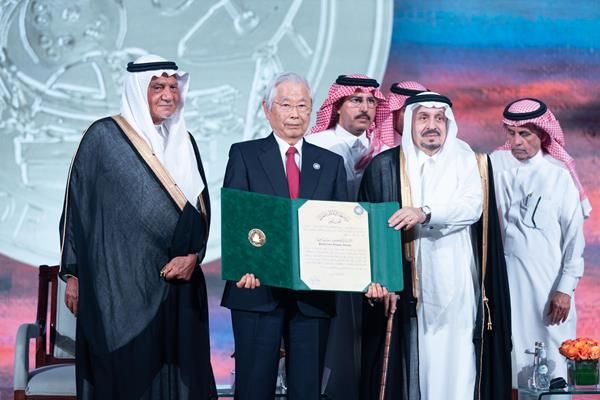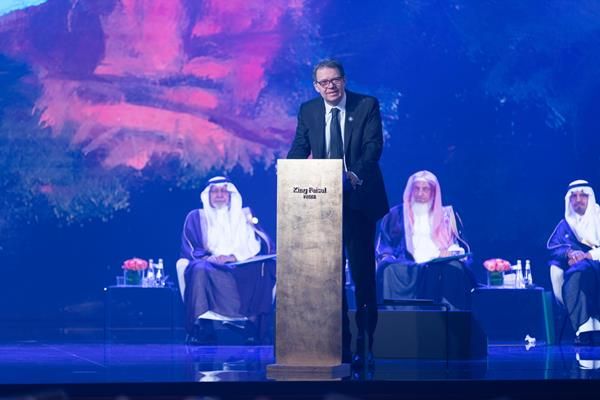King Faisal Foundation
Cancer Treatment Revolutionized by Cellular Engineering, and Nanotechnology Redefined by Carbon Nanotubes: Success of Scientists from Canada & Japan Honored by King Faisal Prize
Cancer Treatment Revolutionized by Cellular Engineering, and Nanotechnology Redefined by Carbon Nanotubes: Success of Scientists from Canada & Japan Honored by King Faisal Prize
Riyadh, Saudi Arabia, April 14, 2025 (GLOBE NEWSWIRE) -- During the 47th session of the King Faisal Prize on April 14, exceptional accomplishments in the fields of cellular engineering and nanotechnology were honored. Professor Michel Sadelain was awarded the Medicine Prize for his groundbreaking contributions to Chimeric Antigen Receptor (CAR) T-cell therapy, a revolutionary cancer treatment that has transformed immunotherapy and inspired advancements in regenerative medicine. Professor Sumio Iijima received the Science Prize for his pioneering discovery of carbon nanotubes, which has redefined nanotechnology and enabled innovations across materials science, electronics, and medicine.
Through innovative cellular engineering, Professor Sadelain, the founding director of the Center for Cell Engineering at Memorial Sloan Kettering Cancer Center, has spearheaded the development of CAR T-cell therapy, a breakthrough that has revolutionized cancer treatment. His research has led to the first FDA-approved CAR T-cell therapies, offering new hope to cancer patients worldwide. "We have taken T cells, the soldiers of the immune system, and equipped them with the ability to recognize and eliminate cancer cells," Professor Sadelain stated. "This journey, from concept to clinical application, underscores the power of innovation in medicine."
Professor Sadelain’s impact extends beyond CAR T-cell therapy, as he continues to lead groundbreaking research in cellular therapies. With over 280 peer-reviewed papers and more than 60 patents, his work has earned him numerous prestigious awards, including the Breakthrough Prize in Life Sciences, the Canada Gairdner Award, and the Clarivate Citation Laureate in Physiology or Medicine.
His research has played a pivotal role in transforming how the medical community perceives and approaches cancer treatment. CAR T-cell therapy works by genetically modifying a patient’s own T cells to express synthetic receptors that allow them to recognize and destroy cancer cells more effectively. This innovative approach has provided unprecedented success in treating hematologic malignancies such as acute lymphoblastic leukemia (ALL) and large B-cell lymphomas (LBCL), where conventional treatments had previously been insufficient.
The development of this therapy required decades of persistence and refinement. Early experiments in CAR T-cell therapy faced significant hurdles, including challenges related to toxicity, the limited persistence of modified T cells in the body, and manufacturing constraints. Professor Sadelain and his team overcame these obstacles by refining receptor designs, incorporating co-stimulatory domains, and optimizing cell expansion techniques. The results led to the second-generation CAR T-cell therapy, which demonstrated greater efficacy, prolonged activity in patients, and enhanced safety.
The U.S. Food and Drug Administration (FDA) approved the first CAR T-cell therapy in 2017, marking a historic milestone in oncology. Since then, the technology has been further developed to target additional blood cancers and is now being explored as a potential treatment for solid tumors. Professor Sadelain's work has inspired a new wave of research into cellular immunotherapies, leading to innovations in gene-editing technologies such as CRISPR-based modifications and next-generation CAR T-cell designs that could further improve treatment outcomes.
Beyond laboratory research, Professor Sadelain has been instrumental in translating CAR T-cell technology into clinical applications. As the founding director of the Center for Cell Engineering at Memorial Sloan Kettering Cancer Center, he has mentored a new generation of researchers and fostered collaborations between academia and the biopharmaceutical industry. These partnerships have accelerated the development and commercialization of CAR T-cell therapies, bringing life-saving treatments to thousands of patients worldwide.
Professor Sadelain’s leadership extends to advocating for broader access to cellular therapies. As CAR T-cell treatments remain expensive and logistically complex, he has worked closely with policymakers and healthcare institutions to develop strategies for making these therapies more widely available. His commitment to ensuring equitable access underscores his belief that medical innovation should benefit all patients, regardless of financial or geographic barriers.
On the frontier of nanotechnology, Professor Sumio Iijima, an honorary fellow of the National Institute of Advanced Industrial Science and Technology (AIST) in Japan, has revolutionized materials science with his discovery of carbon nanotubes. “My contribution was the discovery of carbon nanotubes and the elucidation of their atomic structure. They have triggered flourishing nanoscience and nanotechnology” Professor Iijima remarked. These cylindrical nanostructures exhibit extraordinary mechanical, electrical, and thermal properties, making them foundational to modern nanotechnology. His pioneering research has influenced fields ranging from electronics to medicine, enabling breakthroughs in drug delivery, water purification, and next-generation computing.
The discovery of carbon nanotubes (CNTs) in 1991 marked a turning point in nanotechnology, offering materials with exceptional strength, flexibility, and conductivity. These tiny cylindrical structures, composed of rolled graphene sheets, have diameters as small as one nanometer but possess tensile strengths over 100 times greater than steel while being significantly lighter. This extraordinary combination of properties has opened the door to innovations across multiple disciplines.
One of the most transformative applications of CNTs has been in the electronics industry. Due to their remarkable electrical conductivity, CNTs have been explored as potential replacements for traditional silicon-based semiconductors, paving the way for faster and more energy-efficient transistors. Their use in flexible electronics has led to the development of bendable displays, wearable technology, and advanced sensors that can detect changes in the human body at the molecular level.
In medicine, CNTs have proven to be a game-changer in drug delivery and cancer treatment. Their nanoscale dimensions allow them to penetrate cell membranes and deliver targeted therapies directly to diseased cells, reducing side effects associated with conventional chemotherapy. Researchers have also investigated their potential for use in biosensors that detect diseases at earlier stages, offering new hope for patients with conditions such as cancer, Alzheimer's, and diabetes.
Another groundbreaking application of CNTs is in energy storage. Scientists have developed high-capacity lithium-ion batteries using CNTs as electrodes, significantly improving battery life and charging speeds. These advancements have fueled the rise of electric vehicles, enabling longer driving ranges and more efficient energy consumption. Additionally, CNT-based supercapacitors have shown promise in storing renewable energy from solar and wind power, contributing to a greener and more sustainable future.
Environmental sustainability has also benefited from CNT technology. Their exceptional filtration capabilities have been harnessed in water purification systems, where CNT membranes can remove pollutants, heavy metals, and even bacteria from contaminated water sources. This innovation has the potential to address global water scarcity issues and improve access to clean drinking water in developing regions.
Professor Iijima’s discovery has not only reshaped scientific understanding but has also driven industrial advancements. Industries such as aerospace and automotive manufacturing have adopted CNT-reinforced materials to create lighter and more fuel-efficient vehicles, reducing carbon emissions and improving performance. Similarly, the construction sector has explored CNT-infused concrete to enhance structural durability and resistance to environmental damage.
Professor Iijima’s contributions have been recognized globally, with accolades including the Franklin Medal in Physics, the Balzan Prize, and the Order of Culture Merits from Japan. At the King Faisal Prize ceremony Professor Iijima remarked “I received this prestigious prize as a representative of the international scientific community working on nanoscale phenomena in physics and chemistry.” His seminal paper on carbon nanotubes has been cited over 58,000 times, underscoring its transformative impact on scientific research. His influence extends beyond academia, as he has mentored numerous scientists who continue to push the boundaries of nanotechnology.
In addition to honoring advancements in medicine and science, King Faisal Prize recognized the achievements of outstanding figures in Islamic Studies and Service to Islam. Professor Said Al-Said and Professor Saad Al-Rashed were jointly awarded the Islamic Studies Prize for their pioneering research in archaeology and the preservation of cultural heritage in Saudi Arabia. Professor Al-Said’s extensive work in uncovering the Arabian Peninsula's historical significance and Professor Al-Rashed’s groundbreaking studies on Islamic pilgrimage routes and early Islamic cities have significantly enriched our understanding of the region’s history.
The Service to Islam Prize was awarded to the Tebyan Quran Project from the Liajlehum Association for Serving People with Disabilities, in recognition of its significant contributions to making the Holy Quran accessible to the deaf and hearing-impaired community. Established in 2018, the Tebyan Quran Project provides a complete Quranic interpretation in sign language, allowing individuals who are deaf or have hearing impairments to understand and reflect upon the meanings of the Holy Quran. The project utilizes an advanced electronic application featuring interactive visuals and sign language translations, making it accessible to children, students, and adults.
King Faisal Prize for Arabic Language & Literature for 2025, focused on "Studies of Identity in Arabic Literature," was withheld due to nominated works not meeting the prize criteria.
The prize ceremony was held in Riyadh under the auspices of His Majesty King Salman bin Abdulaziz represented by the Governor of Riyadh HRH Prince Faisal bin Bandar bin Abdulaziz, in the presence of distinguished guests, and global leaders in science, medicine, and academia. The event celebrated the spirit of discovery and innovation, reinforcing the Prize’s legacy as one of the most prestigious global awards recognizing excellence in intellectual and humanitarian contributions.
Since 1979, the King Faisal Prize has honored 299 laureates who have made distinguished contributions to different sciences and causes. Each laureate is awarded USD 200,000, a 24-carat gold medal weighing 200 grams, and a certificate inscribed with their name and a summary of their work that qualified them for the prize.
Attachments
Malak Alomari King Faisal Foundation 0598188696 malomari@kff.com


Subscribe to releases from Globenewswire
Subscribe to all the latest releases from Globenewswire by registering your e-mail address below. You can unsubscribe at any time.
Latest releases from Globenewswire
Danish Aerospace Company A/S16.4.2025 09:11:24 CEST | Press release
Reporting on transactions in Danish Aerospace Company A/S’ shares by persons discharging managerial responsibilities and persons closely associated with them
Danish Aerospace Company A/S16.4.2025 09:11:24 CEST | Pressemeddelelse
Rapportering om transaktioner i Danish Aerospace Company A/S’ aktier foretaget af personer med ledelsesansvar og personer, der er nært knyttet til dem
Bitwise Europe16.4.2025 09:03:00 CEST | Press release
Bitwise expands institutional–grade access to Bitcoin and Ethereum with four ETP listings on London Stock Exchange
Signify16.4.2025 09:00:00 CEST | Press release
Signify completes share repurchases to cover share-based remuneration and continues with the share repurchases for capital reduction
Ress Life Investments A/S16.4.2025 09:00:00 CEST | Press release
Ress Life Investments A/S publishes portfolio composition for Q1 2025
In our pressroom you can read all our latest releases, find our press contacts, images, documents and other relevant information about us.
Visit our pressroom